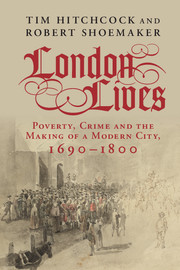Book contents
- Frontmatter
- Dedication
- Contents
- List of figures
- Preface
- Acknowledgements
- List of abbreviations
- 1 Introduction
- 2 Beggarman, thief: 1690–1713
- 3 Protest and resistance: 1713–1731
- 4 Vestries, justices and their opponents: 1731–1748
- 5 Reformers and their discontents: 1748–1763
- 6 Finding a voice: 1763–1776
- 7 The state in chaos: 1776–1789
- 8 Epilogue: The 1790s
- Bibliography
- Index
- References
3 - Protest and resistance: 1713–1731
Published online by Cambridge University Press: 05 December 2015
- Frontmatter
- Dedication
- Contents
- List of figures
- Preface
- Acknowledgements
- List of abbreviations
- 1 Introduction
- 2 Beggarman, thief: 1690–1713
- 3 Protest and resistance: 1713–1731
- 4 Vestries, justices and their opponents: 1731–1748
- 5 Reformers and their discontents: 1748–1763
- 6 Finding a voice: 1763–1776
- 7 The state in chaos: 1776–1789
- 8 Epilogue: The 1790s
- Bibliography
- Index
- References
Summary
Introduction
The arrival of peace with the Treaty of Utrecht in 1713, followed by the death of Queen Anne and the controversial accession of George I the following year, fuelled a crisis of law and order that had been brewing for half a decade. While wartime employment had to some extent mitigated the socio-economic difficulties caused by poor harvests, demobilisation set in train a new wave of crime and prosecution. Moreover, the disorder occasioned by the defence of religion and opposition to the Hanoverian succession, dating back to the Sacheverell Riots of 1710, allowed socio-economic grievances to be expressed through riot.
The new Hanoverian monarchy and whig government were not slow to respond to the pressures, not least with legislation including the Riot Act in 1715 and the Transportation Act in 1718. In part, these developments led to the creation of a more powerful central authority that found expression in the whig rule of Walpole and the Robinocracy. However, for poor Londoners, this was also a moment when divisions within the elite over church and politics gave them a voice. The corruption laid bare in the South Sea Bubble provided a new language that could be used to critique aggressive prosecution of crime and oppression of the poor. This politics threw into uneasy alliance the poor and the middling sort men who ran the parishes and sat on juries, setting them at odds with parliament and an increasingly powerful whig elite. But while central government grew in relative power, most new social policies were implemented at the local level. The most important poor law initiative of the period – the Workhouse Test Act of 1723 – was drafted as permissive legislation, leaving the initiative to the parishes, while responses to crime were dominated by the increasingly entrepreneurial activities of informers and thief-takers. For the next few decades, as parliament became more active, the character of change in London was markedly piecemeal, and open to challenge. For the city’s poorest inhabitants, the 1710s and 1720s represented a moment of real, if still circumscribed, agency, in which the divided politics of the parish and the elite gave them a voice.
- Type
- Chapter
- Information
- London LivesPoverty, Crime and the Making of a Modern City, 1690–1800, pp. 70 - 135Publisher: Cambridge University PressPrint publication year: 2015



